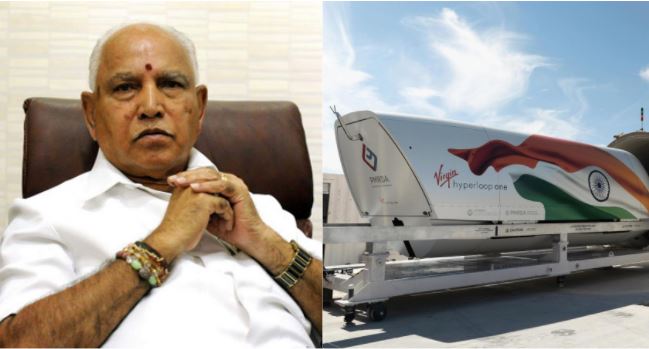If you ask someone from Bengaluru what is the biggest problem of the city, the most likely answer would be traffic, especially the time it takes to reach the airport. The stand-up comedians in India keep the audience entertained for hours just by talking about the traffic of Bengaluru, but now all of this is set to get solved if the people of the city are lucky.
Bengaluru International Airport Limited (BIAL) and Virgin Hyperloop have signed a Memorandum of Understanding (MoU) to conduct feasibility study of a hyperloop corridor between Kempegowda International Airport to Bengaluru city. If the project is found feasible and progress is made, the travel time from the city to airport would be reduced to 10 minutes.
“The pre-feasibility study, which focuses on technical, economic and route feasibility, is expected to be completed in two phases of six months each. With a speed of up to 1,080 kmph, the hyperloop could transport thousands of passengers per hour from Bengaluru Airport to the city centre in under 10 minutes, according to the preliminary analysis,” the statement read.
https://twitter.com/BLRAirport/status/1310097521327235072
The MoU was exchanged between Sultan bin Sulayem, Chairman of Virgin Hyperloop and DP World, and T.M. Vijay Bhaskar, Chief Secretary of Karnataka and Chairman of the Board of Directors at BIAL in the presence of Kapil Mohan, Principal Secretary, Infrastructure Development Department.
“The commissioning of a feasibility study for hyperloop connectivity from Bengaluru Airport is another major step towards building the infrastructure required to define mobility for the future and enabling the efficient movement of people,” said TM Vijay Bhaskar.
On the other hand, Sultan talked about the efficiency in the supply chain that this project would bring. “A hyperloop-connected airport would dramatically improve the delivery of cargo and create an ultra-efficient supply chain,” said Sultan bin Sulayem.
Previously Maharashtra was set to get India’s first hyperloop when Fadnavis government signed a deal with the same hyperloop company to connect Mumbai and Pune. The time taken to travel the distance between the two cities was set to reduced to 35 minutes, but the new Maha Vikas Aghadi (MVA) alliance government found it too costly.
Speaking in a typical leftist politician tone, the finance minister of state, Ajit Pawar, said: “Hyperloops have never been constructed anywhere in the world until now, so let this be tried somewhere else before us. Once it is successful, then we can think of it.”
The alliance government first stopped the payments of the Bullet train project, and then stalled the hyperloop project. “It’s just that we do not have the capacity to experiment with hyperloop technology,” said Ajit Pawar.
The $10 billion hyperloop project aimed to reduce travel time between Mumbai and Pune from four hours to less than 35 minutes, covering the distance of 150 km between the two cities.
Hyperloop is high-speed travel in tubes where a pod-like vehicle travels through a tube at a speed which is more than the usual airline speed. Its first open-source design was released by a joint team of Tesla and SpaceX. The speed of this mode of transport is 1,200 km per hour and the technology is expected to revolutionize transportation.
Previously, when the hyperloop project was being inaugurated, the then chief minister of Maharashtra, Devendra Fadnavis, had said, “Maharashtra will create the first hyperloop transportation system in the world and a global hyperloop supply chain starting from Pune. Maharashtra and India are at the forefront of hyperloop infrastructure building now and this is a moment of pride for our people.”
Maharashtra lost the hyperloop project with the loss of BJP led government and now BJP governed Karnataka is set to get the first hyperloop project. This shows the critical difference between the functioning of the BJP government and that of other parties. On one hand, BJP aims to make India the country with cutting edge infrastructure equipped with modern technology, while other parties are still living with a third world county mindset, where every technology comes to India after that is tried and tested in other countries.
